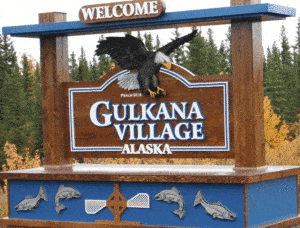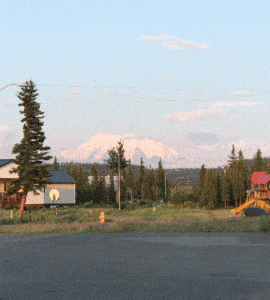An Active Village Council Works to Meet the Needs of Tribal Members with Alternative Energy, Public Transportation and Outreach
The Ahtna Athabascan people have lived in the Copper River basin for time immemorial. There are eight villages within the Ahtna region; each is unique but all are connected by the values and traditions of the Ahtna people and culture. In this issue we are highlighting the village of C’ ulc’e Na’ (Gulkana).

Gulkana was originally established in 1903 as a telegraph station and today has an active and progressive Village Council. The community holds many modern amenities, including paved roads, a wood pellet mill, street lights, and Soaring Eagle Transit.
The history of Gulkana Village began when Chief Ewan and his family settled on the south side of the Gulkana River in the early 1900s. Around the same time The Valdez Eagle Trail, a pathway connecting Valdez and Eagle City, was constructed for miners traveling between cities. Gulkana became a stop along the Trail. The condition of the trail was so rough that federal assistance was requested to improve the road conditions. A temporary bridge across the Gulkana River was built in 1911. A permanent bridge was built in 1912. The bridge failed in 1928 and was replaced by a larger bridge constructed in 1929. In 1943, a bridge was constructed downstream of the previous bridge by the Alaska Road Commission. Construction of the bridge bisected the village and its cemetery. The 1943 bridge made Gulkana unlivable as a cohesive village and unsafe during break up. Without the permission of the Gulkana Tribe, the Federal Townsite Trustee gave this land to the Alaska State Department of Transportation. The GVC Elders have since worked tirelessly on ways to obtain ownership of their former village and cemetery. They hope to re-gain ownership in the near future. The village members moved to the current location of the village which was first established as a telegraph station by the U.S. Army Signal Corps in 1903. The current location is on the north side of the Gulkana River on higher ground.
Gulkana Village Council (GVC) is a federally recognized tribe and operates as a non-profit business with many programs to help improve the lives of the tribal members such as the Indian General Assistance Program (IGAP), Native American Lands Environmental Mitigation Program (NALEMP), Soaring Eagle Transit, Fire Fuels, Indian Reservation Roads (IRR), and Indian Child Welfare Act (ICWA). GVC currently operates its own Public Water Services through a newly constructed water treatment facility, using MIEX technology. The GVC oversees and maintains independent village infrastructure assets, including the water, sewer, and roads. Over the years, the GVC has worked to improve the quality of life for tribal members and village residents.
Gulkana Village Council provides both Tribal and City grants/programs. Gulkana Village Council received a grant through the Alaska Native Tribal Health Consortium (ANTHC) for a new water plant which became operational in September 2013. The water plant is a public water system and operated under Department of Environmental Conservation (DEC) requirements. The new water plant provides drinking water which the residents had never had before. The plant has its own water budget, which is paid for through the water users and supplemented by GVC. There have been some issues that the GVC has had to work through. According to Angela Vermillion, GVC Tribal Administrator, “Our biggest challenge is providing a continuous water source for homes during the harsh cold weather.”

GVC has been receiving NALEMP grants for remediating tribal land that has hazardous materials, providing seasonal jobs for tribal members and residents. The Council also received a grant from AEA in 2011 for a Wood Boiler System which provides heat to the Tribal Buildings and have successfully operated the boiler system since its installment, resulting in a 40% reduction in heating oil costs and providing employment for a part-time winter position.
GVC’s Family Services program provides many community services, including youth outreach activities such as After School Tutoring, student field trips, sports tournaments, movie nights and a K-12 Summer Reading Program. The Family Services Program also promotes community involvement by sponsoring community events. Events include a monthly Family Night featuring a guest speaker and dinner. The topics range from Drug Awareness including tobacco prevention to Elders sharing their wisdom and teaching traditional Ahtna values. Other Family Services events have included two 9-week long Financial Peace Seminars, with instruction on how to successfully manage money and become debt-free. To assist Tribal members, steep discounts are offered for financial classes, and free child care and dinner are provided during the once-a-week sessions. Currently, GVC’s Family Services is looking forward to hosting its next class: an advanced seven-week financial course, The Legacy Journey, which builds off the Financial Peace seminar.

Gulkana Village Council also runs Soaring Eagle Transit (SET), a regional program in operation since 2009. SET provides reliable public transportation for the Copper River Basin, meeting the Basin’s transportation needs for healthcare, education, employment, recreation, and community activities. SET provides not only transportation but jobs to the region and logs an impressive 175,000 miles per year. SET employs three full-time drivers, one part-time on-call driver, a full-time dispatcher and a manager. Much needed Medicaid transportation is provided through their services which include a Monday-Friday route from Gakona to Copper Center with stops in between including Glennallen, and service to Anchorage on Tuesday, Thursday and Saturday. Service to Valdez runs during the summer months for customers with a reservation three times a week. SET also provides call-out services within approximately a 50-mile radius from Gulkana.
A major project the tribe continues to develop is the Biomass Plant. Their goal is to provide more local jobs and an alternative heating source for homes and commercial buildings. GVC has successfully acquired various grants throughout the years with the goal to build a sustainable Biomass Plant debt-free. Through hard work and determination, the Village Council looks forward to the completion of the plant this year that would allow them to produce pellets and wood chips. The tribe has obtained grants including USDA, BIA Fire Fuels, the State of Alaska, and GVC investments to build the Biomass Plant. Once a business plan is developed and in place, the goal would be for the plant to produce commercially available products through Soaring Eagle Biomass.
To make their village even more self-sufficient, GVC is looking toward investing in alternate energy sources. Gulkana Village Council plans to install two solar panels to reduce electricity costs for seven of their buildings, including the community hall, offices, clinic, and the water plant. The panels have been purchased with installation scheduled for 2018. Solar energy will help the tribe continue with their plan of greater self-sustainability and continue to work towards renewable energy opportunities.
For more information on Gulkana Village Council programs and services, visit www.gvigap.com
For more information on Soaring Eagle Transit call (907) 822-4545 or visit www.gulkanacouncil.org/index.html
